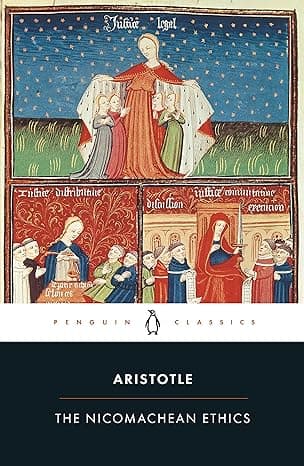
Book Stats
300
Upvotes
67
Downvotes
+233
Net Score
The Nicomachean Ethics
by Aristotle
Description
Aristotle's exploration of how to live well and achieve happiness (eudaimonia), developing the concept of virtue ethics that continues to influence moral philosophy today.
What does it mean to live a good life? Aristotle's Nicomachean Ethics addresses this fundamental question through systematic analysis of human character, moral virtue, and the conditions necessary for human flourishing. Rather than focusing on rules or consequences, Aristotle examines what kinds of people we should strive to become.
Aristotle's concept of virtue as a mean between extremes provides a practical framework for ethical decision-making. Courage, for example, is the mean between cowardice (deficiency) and recklessness (excess). This approach recognizes that moral behavior requires practical wisdom and situational judgment rather than rigid rule-following.
The distinction between moral and intellectual virtues is crucial to Aristotle's system. Moral virtues like courage, temperance, and generosity are acquired through practice and habit, while intellectual virtues like scientific knowledge and practical wisdom are developed through teaching and experience. Both types are necessary for complete human flourishing.
Aristotle's analysis of friendship occupies a central place in the work, reflecting his understanding that humans are fundamentally social beings. He distinguishes between friendships based on utility, pleasure, and virtue, arguing that only friendships between virtuous people who appreciate each other's character can provide lasting satisfaction.
The concept of eudaimonia—often translated as happiness but better understood as flourishing or living well—drives the entire inquiry. Aristotle argues that eudaimonia is not a feeling but an activity, not something we have but something we do. It requires the exercise of virtue over a complete lifetime.
The work's treatment of weakness of will addresses the common human experience of knowing what's right but failing to do it. Aristotle's analysis of how emotion and desire can override rational judgment provides insights that remain relevant for contemporary psychology and moral education.
The Nicomachean Ethics has profoundly influenced Western moral philosophy, providing an alternative to both duty-based and consequence-based ethical theories. Its emphasis on character development and practical wisdom speaks to contemporary discussions about moral education and the relationship between personal and political virtue.